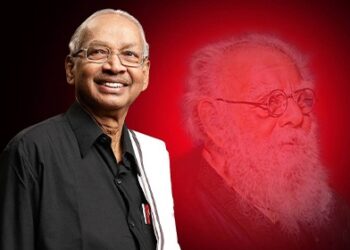Carnatic musician T.M. Krishna in singing posture
Following the announcement of the Music Academy, Chennai, to confer the ‘Sangeetha Kalanidhi Award – 2024’ on eminent musician T.M.Krishna, Carnatic vocalist sisters Ranjani and Gayatri had raised a storm of protest. They wrote to N. Murali, the President of the Academy announcing that they would be skipping the annual conference to be held in December 2024. Their contention is that Krishna has been opposing the spiritual leaders Sankaracharis and hence awarding him is not fair. The vocalist duo posted their letter hastily on social media without waiting for the reply of the President of the Academy.
In his reply to the sisters Ranjani and Gayatri, the President had clearly stated that the choice of awardee is the prerogative of the Music Academy. He had added further that the award was being conferred on the basis of Krishna’s incredible music talent – and not on the basis of his social thinking. He had also expressed his displeasure over the letter posted on the face-book page. He had made it clear that the decision of the Academy is irreversible. The firm stand of Thiru. Murali is certainly commendable because the attempt of the vocalist sisters mixes petty politics in music.
The singers have tarnished the image of the unparalleled humanist Periyar by falsely blaming him for promoting the genocide of brahmins. They have dared to state a white lie that he had humiliated Brahmin women by his obscene comments. Periyar opposed brahminocracy and the dominance of brahmins – not brahmins as individual entities. No historical fact exists anywhere that Periyar had led violent agitations or riots against individual brahmins. His fight was an issue based one – an ideological protest only against the atrocities committed by a group of them in general.
Such controversies cropping up time and again prove that brahmins willingly invite troubles for themselves and that they are not ready to get adapted to the changing times. Obviously, T.M. Krishna is being targeted because of his progressive thinking. His excellence in music over his long career is being ignored by the protesting critics. Many maestros of Carnatic music who were recipients of reputed awards in the past by the Academy have rushed to return those awards. This sounds indeed unpleasant and disgraceful.
Thanthai Periyar fought for women empowerment, equality and rights throughout his life. Brahmin women were never excluded by him in this struggle. He was always impartial. Infact, his common fights have brought out a lot of reformations today in Brahmin communities. Widows do not get tonsured and isolated these days. It is historical truth that brahmin women have derived benefits largely by all the fights of Periyar for Women’s rights. Ironically, the Manu Shastra adhered to by brahmins has been against women attending musical concerts. Sankarachari had once stated that working women cannot be fidel and chaste. Many Carnatic music exponents have objected to women playing instruments on stage, accompanying the main singers.
Non-brahmin vocalists used to be humiliated on the stage. Periyar condemned it and organised an exclusive conference for music world, simultaneously with his self-respect conference. Periyar had delivered speeches protesting against the foul treatment meted out to women vocalists. T.M. Krishna too hails from a Brahmin sect but he has dared to question the hypocrisy of Brahmin artists in the music world. Very rarely we find such bold people questioning their own people. Krishna is one of the exceptional brahmins, raising voice against brahminism. It is a rare occurrence indeed.
The mutiny of some artists in the Carnatic music world against the awarding of Sangeeta Kalanidhi Award to T.M. Krishna is indeed undesirable. He has been questioning only the poor practices in India’s classical traditions but has never ever been attacking the art. He has not brought down edifices of Carnatic music. The tragedy is not that Krishna is taking a critical look at the Carnatic music and classical arts. The tragedy is that at present he is the only one doing it.
Arun Ram of ‘The Times of India’ implied that Periyar was a catalyst of social reform. Nobody can dismiss his convictions over the self-respect of the downtrodden and women empowerment. The distinction between brahmins and brahminism must be made by his critics. The virtue of being born as a brahmin cannot make one entitled for exclusive caste supremacy.
T.M. Krishna tried to take Carnatic music to the slum dwellers. He probed into the making of the Mridangam using cow-hide. He did sing in praise of Periyar, Allah and Jesus in Carnatic tunes. But all these sentiments represent only brahminism that has been stomped upon by Krishna — not brahmins. This distinction should not escape attention.
Arun Ram says, — “If Ranjani and Gayatri are dancing to someone else’s tune, they have chosen the wrong stage. If they are singing their own song, it is set on the wrong rhythm.” According to music critic Malini Nair (‘The Times of India’ article) – the Carnatic music world cannot crumble by the questions of Krishna. Every culture is subject to criticism, research and inquiry. If Krishna is taking a critical look at Carnatic music, it is not a crime. He has merely questioned the Carnatic ecosystem and its discriminatory practices. His criticism has in no way vilified carnatic music and the artists. If the vocalists and percussionists really wish to see star performers emerge from underprivileged communities and dominate stages they should stay away from destructive criticism and biased views. Let us hope, there would be absolute calm after this storm.
– nietzsche








